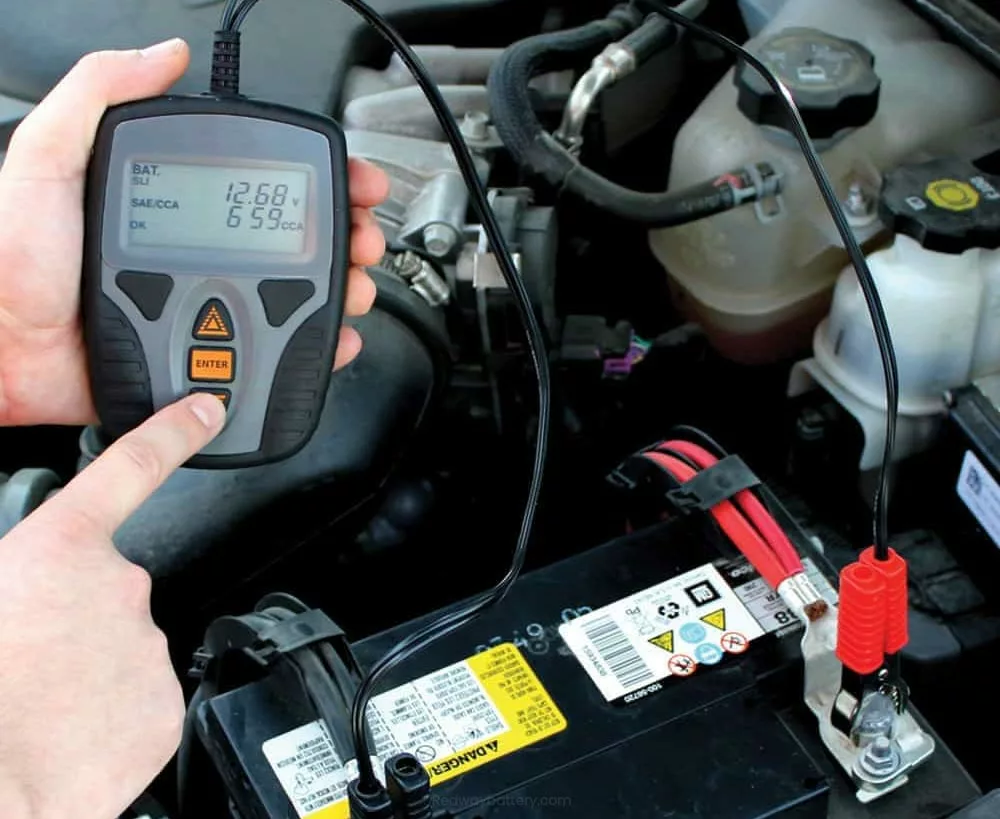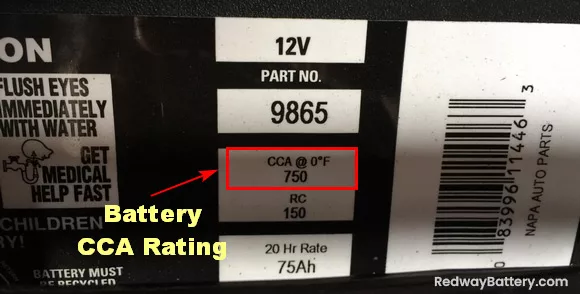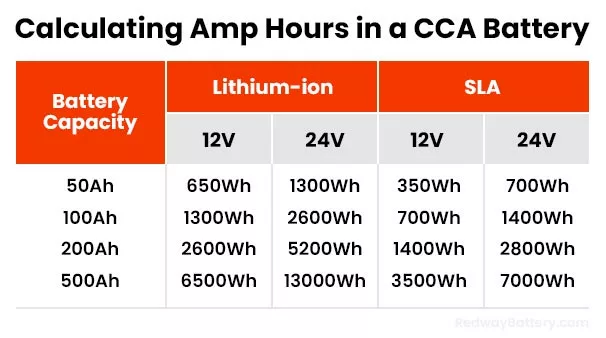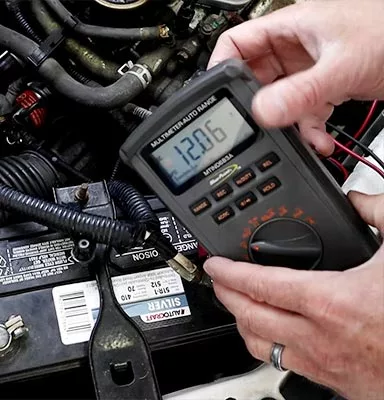Ever struggled to start your car in freezing temperatures? That’s where Cold Cranking Amps (CCA) play a crucial role. In this post, we’ll simplify what CCA means and why it matters, helping you understand its impact on your vehicle’s performance.
How CCA Affects Your Car’s Performance
Cold Cranking Amps (CCA) is pivotal for your car’s performance, particularly in cold weather. Let’s break down how CCA affects your vehicle’s ability to start and run smoothly.

- Starting Challenges in Cold Weather: CCA is crucial during cold starts as it determines the battery’s ability to provide sufficient power to crank the engine. Low CCA ratings may lead to difficulties starting the car, especially in freezing temperatures.
- Matching CCA to Manufacturer’s Recommendations: Having a CCA rating higher than your car’s engine size recommendation doesn’t significantly improve performance. It’s essential to match the manufacturer’s recommended CCA for optimal functionality.
- Factors Affecting CCA: Battery age and wear impact the ability to deliver the advertised CCA rating. As batteries age, internal resistance increases, reducing overall capacity. Regular maintenance, such as checking for corrosion and loose connections, helps maintain good battery health.
- Calculating Ideal CCA for Your Vehicle: To determine the ideal CCA for your car, consider factors like climate conditions and engine size. Consult with automotive professionals for guidance tailored to your specific requirements.
- Advantages of Upgrading with Higher CCA: Upgrading to a battery with a higher CCA rating ensures reliable starts in extreme weather and provides extra reserve power for accessories. Understanding CCA empowers you to make informed decisions when selecting replacement batteries or upgrades that cater to your vehicle’s needs.
Factors That Can Affect CCA
The Cold Cranking Amps (CCA) of your car battery is influenced by various factors, impacting its performance. Let’s delve into these factors to empower you with the knowledge needed for maintaining or upgrading your battery.
- Temperature Impact on CCA: CCA measures a battery’s ability to start your car in cold weather, making temperature a critical factor. Harsh winters reduce a battery’s capacity and output power, necessitating a higher CCA rating for optimal performance in colder regions.
- Age and Condition of the Battery: The age and condition of your battery significantly affect its CCA. Over time, chemical reactions within batteries lead to a natural loss of capacity. Regularly checking your battery’s health and timely replacement are crucial maintenance practices.
- Vehicle Size and Type: The size and type of your vehicle play a role in determining the required CCA rating. Larger vehicles with larger engines generally demand more starting power compared to smaller vehicles, emphasizing the importance of matching CCA to your specific vehicle.
- Electrical Accessories and Aftermarket Installations: Electrical accessories like stereos, lights, and navigation systems, especially aftermarket installations, can strain the battery during startup. Multiple accessories may require a higher CCA rating to ensure reliable starting power.
- Maintenance Practices for Optimal CCA: Proper maintenance practices, such as keeping terminals clean and ensuring tight connections, are essential for maximizing CCA. Corrosion or loose connections can impede current flow and decrease overall battery performance.
Understanding these factors is key to determining the necessary CCA rating tailored to your specific needs. This knowledge ensures optimal starting power regardless of external conditions or the demands placed on your vehicle’s battery.

How to Calculate the CCA You Need for Your Car
(1) A small car can typically start with a battery featuring 150 Cold Cranking Amps (CCAs). Larger vehicles like pickup trucks and SUVs generally require batteries ranging from 400 to 500 CCAs. Some batteries boast an impressive 1150 CCA rating.
(2) However, the availability of higher CCAs doesn’t necessitate their immediate need. While a higher CCA rating is beneficial, it’s essential to match the battery’s requirements with your vehicle’s needs. A battery with a higher CCA can endure harsh weather conditions and offer superior overall capacity.
(3) For a replacement battery, aim for at least 650 CCAs to ensure reliable performance. Keep in mind that batteries with higher CCA ratings often come at a higher price point.
Calculating the Cold Cranking Amps (CCA) needed for your car is crucial for optimal performance, particularly in cold weather. Here’s a straightforward guide to help you determine the right CCA:
- Check your car’s manual: Start by referring to your vehicle’s manual or consulting the manufacturer for recommended battery specifications, including the appropriate CCA rating.
- Consider climate conditions: If you experience extremely cold winters, opt for a higher CCA rating, as lower temperatures can significantly impact battery performance. Factor in your region’s average winter temperature when making calculations.
- Evaluate driving habits: Different driving patterns affect battery life, influencing the required CCA rating. If you engage in frequent short trips or infrequent driving, consider a higher CCA rating for better performance.
- Assess additional power needs: If your car features power-hungry accessories like high-powered sound systems or aftermarket electronics, account for their energy requirements when determining the necessary CCA.


Remember, choosing a battery with a slightly higher CCA than recommended is a wise decision, ensuring reliable start-ups even in challenging conditions!
Tips for Maintaining Your Car’s CCA
Maintaining your car’s Cold Cranking Amps (CCA) is crucial for reliable performance. Here are simple tips to preserve your battery’s CCA and enhance its longevity:
- Keep terminals clean: Regularly inspect and clean your battery terminals to prevent dirt and corrosion, ensuring a smooth flow of electricity and optimal performance.
- Park in shade: Minimize exposure to extreme temperatures by parking in shaded areas or using a windshield sunshade, preventing heat-related damage to your car’s battery.
- Limit short trips: Opt for longer drives when possible, as frequent short trips may not allow the alternator enough time to fully recharge the battery, impacting its overall health.
- Minimize idle power usage: Avoid running accessories like air conditioning, headlights, or audio systems while idling, reducing unnecessary strain on the battery and preserving its power.
- Test regularly: Periodically test your car’s CCA using a multimeter or seek professional testing to identify potential issues before they escalate.
- Replace when necessary: Be mindful of your battery’s lifespan (typically 3-5 years) and replace it if you observe signs of weak starting power or increased reliance on jump-starts.
Following these tips will help ensure your vehicle’s battery maintains optimal Cold Cranking Amps, guaranteeing reliable starts every time.
Benefits of Upgrading Your Battery’s CCA Rating
Upgrading your car battery’s Cold Cranking Amps (CCA) rating offers numerous benefits for enhanced performance. Here’s a concise breakdown of the advantages:
- Improved Reliability: Upgrading CCA ensures more electrical power for quick engine starts, particularly beneficial in cold weather when engines face increased resistance.
- Enhanced Accessory Performance: A higher CCA rating supports power-hungry accessories like audio systems and lighting, delivering ample energy without straining the battery.
- Peace of Mind and Cost Savings: A battery with a higher CCA provides confidence during long drives and extreme weather, reducing strain on components like starters and alternators, potentially lowering repair costs in the future.

Understanding CCA is crucial for maintaining your vehicle’s reliability. Choose a battery with the right CCA based on climate and usage for optimal performance and longevity. Regular battery health checks and proper maintenance contribute to maximizing CCA potential, ensuring your vehicle starts reliably in diverse conditions.

